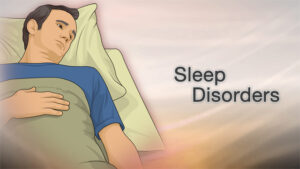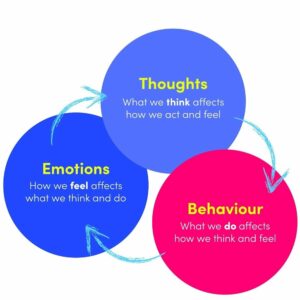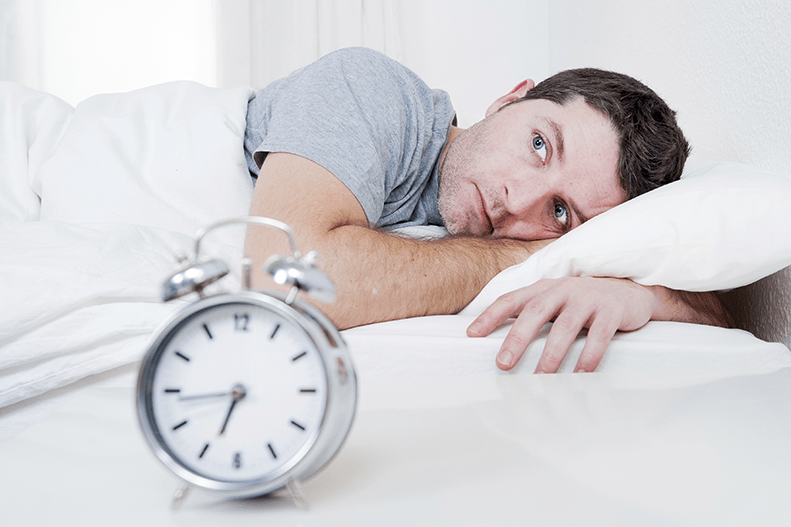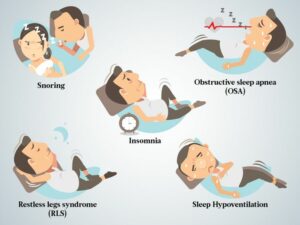People with sleep disorders often have trouble falling asleep, staying asleep, or both. Sleep disorders can be caused by many things, including stress, anxiety, medication side effects, and health problems. Sleep disorders can be treated with therapy. Therapists can help people learn how to relax and fall asleep. They can also help people deal with the stress and anxiety that may be causing their sleep problems.
Contents
- 1 What Are Sleep Disorders?
- 2 Types Of Sleep Disorders
- 3 What Does Therapy for Sleep Disorders Involve?
- 4 How Does Sleep Therapy Work?
- 5 Types Of Therapy For Sleep Disorder
- 6 Thought challenging in CBT
- 7 Medication for Sleep Disorders
- 8 Who Should See a Therapist for Their Sleep Disorder?
- 9 When Should I Go to Bed to Get Restful Sleep?
- 10 What Can I Do in Order to Get Better Sleep?
- 11 A Word From MantraCare
What Are Sleep Disorders?

Sleep disorder, as mentioned before, is a medical condition that disrupts the natural sleep cycles of an individual. The disorder can either be too much or too little. Below are some common conditions.
Sleep disorders such as narcolepsy and insomnia are the most prevalent type of sleep disorders. They occur due to a variety of reasons that range from anxiety to genetics. It is very difficult for a person with a sleep disorder to go without it for one night. Because they will only feel extreme exhaustion the next day which will lead to fatigue and lack of energy. Sleep disorders can grow worse if left untreated.
Another example of a sleep disorder is Restless Legs Syndrome (RLS). This can be caused by iron deficiency and can affect a sleeping individual when they do not get enough sleep. This disorder is thought to be genetic and, in most cases, is found in adults between the ages of 30 and 60.
Types Of Sleep Disorders
These are some common types of sleep disorders-
 Narcolepsy
Narcolepsy
Narcolepsy is a disorder that causes a person to excessively fall asleep because of a lack of sleep. It is an uncommon sleep disorder that causes people to become very sleepy during the day, often at inappropriate times. It’s hard for people with narcolepsy because they can fall asleep without warning or reason which can affect their work and relationships. Therapy for sleep disorders helps individuals understand
Insomnia
Insomnia is a disorder that causes a person to have trouble sleeping at night. It is a common sleep disorder that occurs when an individual has trouble falling or staying asleep at night. It often happens because of anxiety, stress, depression, health problems, etc. Therapy for sleep disorders can help people find ways to treat their insomnia without having to worry about becoming dependent on medication.
Restless Legs Syndrome (RLS)
Restless Legs Syndrome (RLS) occurs when someone experiences an overwhelming urge to move their legs or arms during the day. And has difficulty falling or staying asleep at night. This may be caused by iron deficiency or other health issues. But is most commonly found in adults between the ages of 30 and 60.
Sleep apnea
Sleep apnea is a disorder that causes a person to have pauses in breathing while they sleep due to a blocked airway or absence of breath. This can cause someone to snore or for them to stop breathing during the night which leads to other issues. It can be caused by other health problems. But is most commonly found in adults between the ages of 40 and 60.
Treatment for sleep disorders is therapy programs for individuals who have trouble sleeping at night. The therapy is only effective when paired with medication so that both therapies will work perfectly together. Therapists, most commonly counselors or psychologists, try to understand the real problem and find out what is causing it. They will work with an individual to find a way where they can fix the problem themselves with their own strengths and abilities. The process is not painful nor long, but it does take time for the individual to open up about their problems. This therapy process can be done through one or more sessions depending on the problem.
What Does Therapy for Sleep Disorders Involve?

Therapy, simply put, is the process of obtaining information from one person with regard to another person in order to better understand the latter. In the case of sleep disorders, it can be a form of treatment for individuals who have trouble sleeping at night. It is only effective when paired with medication so that both therapies will work perfectly together.
How Does Sleep Therapy Work?
The therapist, most commonly a counselor or psychologist, will try and understand the real problem and find out what caused it. They will work to find a way where the individual can fix the problem themselves with their own strengths and abilities.
The process is not painful nor long; however, it does take time for an individual to open up about the problems they face at night. The therapist works with them closely in order for the individual to understand how sleep works. This process can be done through one or more sessions depending on the problem.
Sleep Therapy Benefits
Sleep therapy is beneficial because it can help one fall asleep at night through relaxation techniques or better understand anxiety issues that may be affecting their sleep patterns. It also helps people understand their problems and find ways on how they can fix them themselves.
Therapists, most commonly counselors or psychologists, try to understand the real problem and find out what caused it. They will work with an individual to find a way where they can fix the problem themselves with their own strengths and abilities. The process is not painful or long. But it does take time for the individual to open up about their problems. The therapist works with them closely in order for them to understand how sleep works. This process can be done through one or more sessions depending on the problem.
Types Of Therapy For Sleep Disorder

The most common types of sleep disorders are narcolepsy and insomnia. Narcolepsy can be caused by genetics and is hard for people to go without it for one night. This leads to fatigue and a lack of energy the next day. It’s also very common in adults who are between the ages of 30 and 60. Insomnia is due to a variety of reasons such as anxiety, medication side effects, and health problems.
Relaxation Techniques
Therapy can teach people relaxation techniques that will help them fall asleep, or help them with stress and anxiety issues that may be causing their sleep problems. There are many forms of therapy for sleep disorders: it can be a form of treatment for individuals who have had trouble sleeping at night. It is only effective when paired with medication so that both therapies will work perfectly.
Cognitive-behavioral therapy
Cognitive-behavioral therapy (CBT) is a form of treatment for insomnia where you try to change the way you think about your sleep problems. CBT can be done through self-help books, online programs, or with a therapist.
For example, a person who has insomnia may read a book on ways to break the cycle of not sleeping. The book may explain how changing what time you go to bed and when you wake up can make it easier to fall asleep at night. In this way, cognitive-behavioral therapy helps people find more effective ways to cope with their sleep problems.
How Does CBT Work For Sleep Disorders?
Cognitive-behavioral therapy works with the idea that a person’s thoughts and behaviors influence their emotions. When a person is struggling with a sleep disorder, they may have a negative appraisal of their sleep patterns. This could lead them to increase the time they spend in bed or oversleep in the morning. Cognitive-behavioral therapy seeks to improve this pattern by examining how patients’ thoughts and behaviors are contributing to the cyclical nature of insomnia symptoms.
Thought challenging in CBT

CBT recognizes that someone’s thoughts and behaviors are the main contributors to the cyclical nature of insomnia. The process of CBT includes examining how patients’ thoughts contribute to this pattern. This is done by using thought challenging techniques which are designed to reduce the frequency of negative appraisals or assumptions about sleep.
Identifying your negative thoughts- CBT therapists will help you identify and monitor your sleep-related negative thoughts, such as: “I’ll never be able to fall asleep” and “I’m not going to get any rest.” This can be done by keeping track of these types of thoughts through daily, diary logs or using an app on a smartphone.
Challenging your negative thoughts- After you have identified your negative thoughts, CBT therapists will help you to develop a strategy for challenging them. This usually includes examining the evidence to support these thoughts and looking at other alternatives that may be less distorted. If distortions in thinking are found, they can be corrected by considering an alternative perspective or providing counter-arguments.
Implementing your plan– Once your negative thought patterns have been challenged, the CBT therapist will help you to develop a plan of action. This might include developing a more realistic approach to sleep or using relaxation techniques to reduce anxiety before bedtime. Your sleep diary may be used as a reference point for this process. Since it may take time for new behaviors to feel automatic, your CBT therapist will likely want to meet with you on a weekly basis to monitor progress.
Role Of Relaxation Techniques In CBT
As stress is thought to play a major role in sleep disorders, relaxation techniques are often incorporated into the treatment process. These may include progressive muscle relaxation, guided imagery, and breathing exercises. Your
In addition, CBT is often more successful for mild sleep disorders than for more severe ones. Patients with insomnia symptoms that last for less than three weeks may find it helpful, while they may need more intense treatment when symptoms persist longer.
Medication for Sleep Disorders

There are many types of medication that help individuals fall asleep at night or deal with anxiety issues that may occur. As always, it’s important to talk with your doctor before adding any new medication to your daily routine.
Oftentimes, medication for sleep disorders can help in keeping an individual awake all night long. However, they can be addictive and cause headaches. If you do not want to take medication. Then it is best for you to see a therapist so they can help with your sleep disorder.
If you find it hard to fall asleep at night then it might be because of stress, anxiety, depression, or other factors. It is best if you talk to your family doctor about your sleeping habits and concerns. In order for them to give you a diagnosis.
In most cases, therapy for sleep disorders is not really needed. But when it comes to serious cases then it will be required from the individual. It can help with major issues such as depression or anxiety. So that an individual will feel better after sleeping at night.
The process is not painful and it does take time for an individual to open up about the problems they face at night. They have to take medication so that both therapies will work perfectly together in order to have a good night’s rest.
Who Should See a Therapist for Their Sleep Disorder?

Adult individuals who are having trouble sleeping should visit their therapist immediately in order to get it fixed. It is best to go with what you know and talk to your family doctor than to go to a random therapist.
It is best to talk to your therapist if you are taking any medication for other conditions and issues such as ADHD, depression, or anxiety. Because there might be an underlying issue making it hard for you to sleep. Adults who have reached the age of 18 and had trouble sleeping at night should seek out a therapist immediately. If it has been going on for two weeks or more.
When Should I Go to Bed to Get Restful Sleep?
An individual should be going to bed by 11:00 PM. So they have enough time to relax and sleep before midnight. If you have trouble falling asleep then it is best to try and go to bed early. So you do not stress yourself out. It might help if you get a massage before sleeping, drink chamomile tea, or read a book in order to get your mind focused. If you wake up at night then it is best for you to get up. And read a book or watch TV in order to tire yourself out.
What Can I Do in Order to Get Better Sleep?
An individual should stay away from caffeine, nicotine, and alcohol at night. Because they will only make it harder for her to fall asleep after ingesting them. Limit your workouts before sleeping because it might keep you up all night long if you are not used to it. It is best to go to bed and wake up at the same time every day. Because your body will get used to a routine and you will sleep better when you do that.
A Word From MantraCare
Your mental health — your psychological, emotional, and social well-being — has an impact on every aspect of your life. Positive mental health essentially allows you to effectively deal with life’s everyday challenges.
For more information, please contact MantraCare. Sleep is an essential part of our daily routine and it plays a significant role in maintaining a healthy body and mind. If you have any queries regarding Online Insomnia Counseling experienced therapists at MantraCare can help: Book a trial therapy session

 Narcolepsy
Narcolepsy
